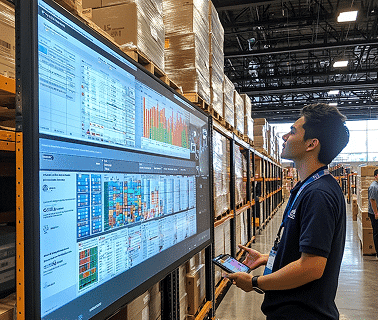Listen to this blog
Synopsis:
- One of the biggest sectors globally is fast-moving consumer goods (FMCG). From our jojoba shampoo-infused morning showers to our breakfast of oats and fruit.
- Technology is the primary facilitator for end-to-end visibility, which is essential for supply chain efficiency.
- Retail businesses in the FMCG industry frequently face industry-specific difficulties, notably in logistics management.
Increasing middle-class incomes and better living standards in most of the country’s tier II and tier III cities are impacting the growth of the fast-moving consumer goods industry.
Innovative practices and well-established distribution networks have helped businesses become more effective. Their primary offerings have allowed them to flourish in the fast-moving consumer goods market and ultimately surpass the competition.
A brief overview of the fast-moving consumer goods (FMCG) business in India is provided, followed by a discussion of how a career in supply chain management can help you facilitate the sector’s growth and where further enhancements to the system can have an even bigger effect.
What is supply chain management?
The goal of supply chain management (SCM) is to optimize value for customers and maintain a competitive edge through strategic supply chain management. It’s indicative of a concerted effort on the part of supply chain companies to design and manage supply chains in the most efficient and effective ways possible. All phases of product creation, procurement, production, and logistics are included in the supply chain and the information systems required for their coordination.
What is FMCG?
Products that sell quickly and in large quantities are said to be “fast-moving.” Due to great demand from customers or the fact that they are perishable, the lifespan of these products is rather brief. Fast-moving items have a low price, are consumed quickly, and are sold frequently.
FMCG companies are under significant price pressure due to global competition and shorter product life cycles. Organizations may better manage this level of competition in the fast-moving consumer goods (FMCG) market with the aid of intelligent logistics solutions. One of its few advantages is the ability to rank sales executives based on experience, skills, preference, and other criteria. If customers choose to spend their time in the store rather than on the road, retailers may experience an uptick in sales.
Stages Of Supply Chain In the FMCG Industry
Supply of raw materials
Managing the sourcing of finished goods is a crucial part of any effective supply chain management in retail. Contracts will be negotiated, and delivery dates will be set with the approved vendors. There needs to be an evaluation of supplier performance and timely supplier payment. Companies may use supply chain networks in certain circumstances. Maintaining compliance with export and import regulations, working with this network, and managing inventory and frozen assets are all part of the job.
In-plant logistics
Logistics within a company’s production plant, including the flow of raw materials, components, and sub-assemblies. Goods are transferred from a storage facility to the facility where they will be finished. Moving finished items to where they may be quickly sold or consumed is also part of the in-plant logistics process.
Storage
Scheduling production activities, testing items, packing, and releasing them all fall under this phase. Rules for performance, required data storage, facility management, and regulatory compliance are all things the organization oversees.
Transportation
All the activities involved in getting your product to your consumer are part of the delivery phase. Businesses must either handle their storage and inventory or hire a third party.
Distribution/delivery
The delivery phase includes shipping the product to the buyer and any necessary follow-ups such as a trial period or warranty, billing, and fee collecting from the buyer or retailer. In addition, businesses must meet export or import stipulations for their final product.
Why is the supply chain important in the FMCG sector?
There are several benefits of supply chain management in the FMCG sector to bring growth to your industry.
Reduces business costs
Supply chain experts aim to reduce expenses and boost profits, despite the inevitability of operational and overhead expenditures. The costs of operating your plant will rise unless proper supply chain management is implemented. To cut costs and boost revenues, you must ensure the product management process runs properly from beginning to end.
Improve product quality
One of the most crucial aspects of managing a supply chain is ensuring its products are of the highest quality. Supply chain managers must conduct regular audits of their suppliers and raw materials to maintain high-quality standards across all products.
Build a strong consumer brand
When customers visit your website, you may access their information from your database and present them with personalized promotions. The more they shop with you, the more detailed and accurate your client profile can become, allowing you to sell to them.
Smooth delivery
One of the latest benefits of supply chain management is the reduced time delays that may be achieved through improved communication. This will reduce the likelihood of problems like late deliveries from suppliers, mishandled logistics in the distribution chain, and bottlenecks on the assembly line, as everyone will be aware of what they and others are doing at all times.
Improve profit margins
Your company’s bottom line will improve if you’re willing to embrace new technology and work together more effectively across departments.
Role of supply chain management in the retail Industry
Inventory management
Inventory management’s significance in the supply chain lies in the fact that it’s the long-term secret to success. Inventory’s ability to keep supply and demand in check is its most important function in supply networks. How well an organization handles its stock of goods is proportional to its size.
Warehouse management
Warehouse management is crucial to the success of the supply chain since it facilitates activities like inventory distribution, sorting, and cross-docking.
Customer analysis
Preparing for demand and evaluating demand signals is important to avoid bottlenecks. Regularly assess consumer demand trends to see whether your seasonal and monthly estimates are accurate. Modifying your supply ordering to reflect better what the business needs to have on hand by considering the most current consumer feedback.
Product demand analysis
Supply chain managers can benefit from careful demand planning if they use it to anticipate the demand for their products and the money their business will generate. Your company may optimize its manufacturing, stocking, and shipping by anticipating and monitoring peak sales periods.
Risk management
Integrity, honesty, and authenticity of products and services throughout the supply chain can be jeopardized if proper steps aren’t taken, which is why SCRM was developed.
Online Manipal
Choosing the right online learning platform among the many available options can take time and effort. In addition, selecting a reputable institute is essential if you want your credential to be recognized in many countries. Manipal Academy of Higher Education (MAHE) is renowned for its high-quality education across several disciplines. MAHE has a NAAC (National Assessment and Accreditation Council) ranking of A++, making it one of the excellent universities in India. Pursuing a PGCP in Logistics & Supply Chain Management will help you explore career opportunities in this domain.
Prepare for your next career milestone with us












